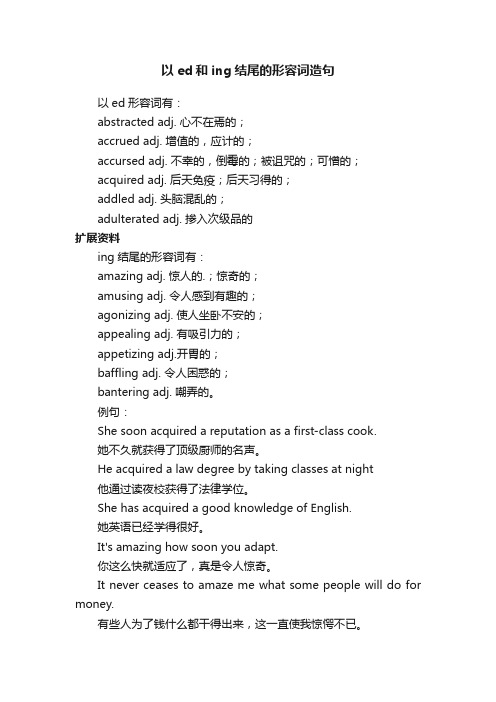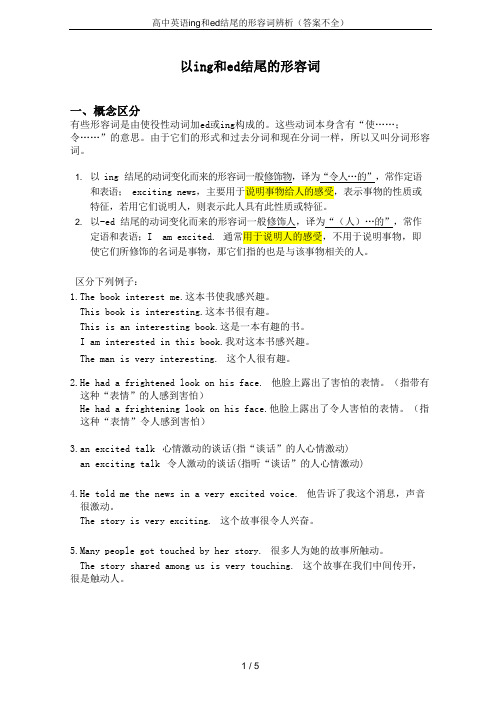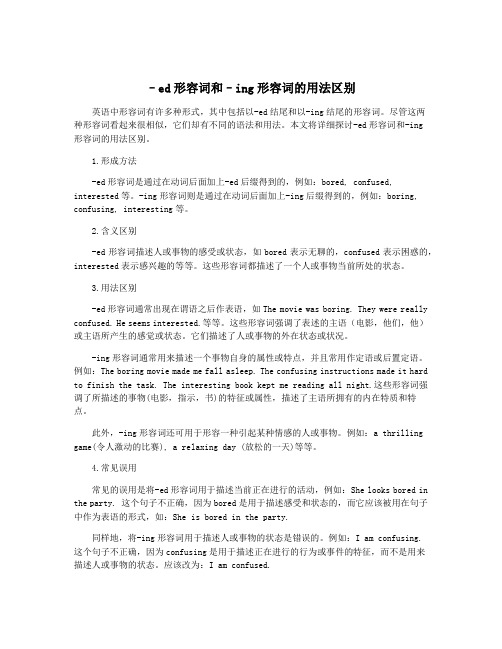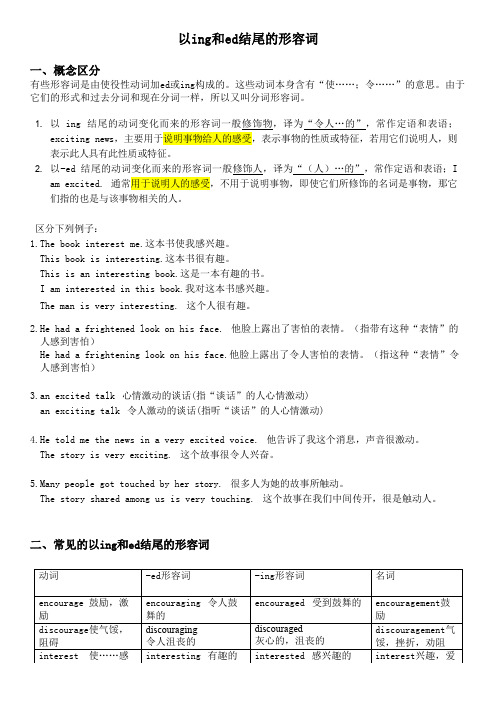eding结尾的形容词
以ed和ing结尾的形容词造句

以ed和ing结尾的形容词造句
以ed形容词有:
abstracted adj. 心不在焉的;
accrued adj. 增值的,应计的;
accursed adj. 不幸的,倒霉的;被诅咒的;可憎的;
acquired adj. 后天免疫;后天习得的;
addled adj. 头脑混乱的;
adulterated adj. 掺入次级品的
扩展资料
ing结尾的形容词有:
amazing adj. 惊人的.;惊奇的;
amusing adj. 令人感到有趣的;
agonizing adj. 使人坐卧不安的;
appealing adj. 有吸引力的;
appetizing adj.开胃的;
baffling adj. 令人困惑的;
bantering adj. 嘲弄的。
例句:
She soon acquired a reputation as a first-class cook.
她不久就获得了顶级厨师的名声。
He acquired a law degree by taking classes at night
他通过读夜校获得了法律学位。
She has acquired a good knowledge of English.
她英语已经学得很好。
It's amazing how soon you adapt.
你这么快就适应了,真是令人惊奇。
It never ceases to amaze me what some people will do for money.
有些人为了钱什么都干得出来,这一直使我惊愕不已。
高中英语ing和ed结尾的形容词辨析(答案不全)

以ing和ed结尾的形容词一、概念区分有些形容词是由使役性动词加ed或ing构成的。
这些动词本身含有“使……;令……”的意思。
由于它们的形式和过去分词和现在分词一样,所以又叫分词形容词。
1. 以 ing 结尾的动词变化而来的形容词一般修饰物,译为“令人…的”,常作定语和表语; exciting news,主要用于说明事物给人的感受,表示事物的性质或特征,若用它们说明人,则表示此人具有此性质或特征。
2. 以-ed 结尾的动词变化而来的形容词一般修饰人,译为“(人)…的”,常作定语和表语;I am excited. 通常用于说明人的感受,不用于说明事物,即使它们所修饰的名词是事物,那它们指的也是与该事物相关的人。
区分下列例子:1.The book interest me.这本书使我感兴趣。
This book is interesting.这本书很有趣。
This is an interesting book.这是一本有趣的书。
I am interested in this book.我对这本书感兴趣。
The man is very interesting. 这个人很有趣。
2.He had a frightened look on his face. 他脸上露出了害怕的表情。
(指带有这种“表情”的人感到害怕)He had a frightening look on his face.他脸上露出了令人害怕的表情。
(指这种“表情”令人感到害怕)3.an excited talk 心情激动的谈话(指“谈话”的人心情激动)an exciting talk 令人激动的谈话(指听“谈话”的人心情激动)4.He told me the news in a very excited voice. 他告诉了我这个消息,声音很激动。
The story is very exciting. 这个故事很令人兴奋。
5.Many people got touched by her story. 很多人为她的故事所触动。
adj.--ing,ed

This book is Betty is
. .
Use the correct form of the words given.
Last week we saw a film about wild animals. We
wrote about it for homework. I’m _i_n_t_e__r_e_s_t_e_d__
The football match is exciting. Ken is excited. (= Ken feels excited. )
-ing,-ed结尾的形容词分别表示的含义
We use exciting, interesting, etc to describe people and things. We use excited, interested, etc to describe feelings.
relax
relaxing
relaxed
frighten
frightening
frightened
excite bore
exciting boring
excited bored
-ing,-ed结尾的形容词分别表示的含义
The song is boring. Ken is bored. ( = Ken feels bored. )
小学高年段形容词学习指引
-ing , -ed 结尾的形容词
含有-ing,-ed结尾的形容词
relaxing interesting exciting
relaxed interested excited
含有-ing,-ed结尾的形容词
v.
adj.
intห้องสมุดไป่ตู้rest
–ed形容词和–ing形容词的用法区别

–ed形容词和–ing形容词的用法区别英语中形容词有许多种形式,其中包括以-ed结尾和以-ing结尾的形容词。
尽管这两种形容词看起来很相似,它们却有不同的语法和用法。
本文将详细探讨-ed形容词和-ing形容词的用法区别。
1.形成方法-ed形容词是通过在动词后面加上-ed后缀得到的,例如:bored, confused, interested等。
-ing形容词则是通过在动词后面加上-ing后缀得到的,例如:boring, confusing, interesting等。
2.含义区别-ed形容词描述人或事物的感受或状态,如bored表示无聊的,confused表示困惑的,interested表示感兴趣的等等。
这些形容词都描述了一个人或事物当前所处的状态。
3.用法区别-ed形容词通常出现在谓语之后作表语,如The movie was boring. They were really confused. He seems interested.等等。
这些形容词强调了表述的主语(电影,他们,他)或主语所产生的感觉或状态。
它们描述了人或事物的外在状态或状况。
-ing形容词通常用来描述一个事物自身的属性或特点,并且常用作定语或后置定语。
例如:The boring movie made me fall asleep. The confusing instructions made it hard to finish the task. The interesting book kept me reading all night.这些形容词强调了所描述的事物(电影,指示,书)的特征或属性,描述了主语所拥有的内在特质和特点。
此外,-ing形容词还可用于形容一种引起某种情感的人或事物。
例如:a thrilling game(令人激动的比赛), a relaxing day (放松的一天)等等。
4.常见误用常见的误用是将-ed形容词用于描述当前正在进行的活动,例如:She looks bored in the party. 这个句子不正确,因为bored是用于描述感受和状态的,而它应该被用在句子中作为表语的形式,如:She is bored in the party.同样地,将-ing形容词用于描述人或事物的状态是错误的。
以-ed, -ing结尾的形容词 初中

以-ed, -ing结尾的形容词初中1. bored (无聊的) - feeling weary and uninterested due to lack of stimulationExample sentence: I am bored because there is no new movie to watch tonight. (由于今晚没有新电影可以看,我感到无聊。
)2. excited (兴奋的) - feeling joy or anticipation about something that is about to happenExample sentence: I am excited about going on a vacation next week. (我对下周的度假感到兴奋。
)3. tired (疲倦的) - feeling drained of energy or worn outExample sentence: After a long day of hiking, I am really tired. (长时间的徒步旅行后,我真的很累。
)4. annoying (恼人的) - causing irritation or frustrationExample sentence: My little brother can be so annoying when he keeps asking the same question repeatedly. (当我弟弟反复问同一个问题时,真是令人恼火。
)5. interesting (有趣的) - arousing curiosity or attentionExample sentence: The documentary we watched last night was really interesting. (昨晚我们看的纪录片真有趣。
以ed和ing结尾的形容词是?

以ed和ing结尾的形容词是?
以ed和ing结尾的形容词:
encouraging 令人鼓舞的;encouraged 受到鼓舞的;
interesting 有趣的; interested 感兴趣的;
astonishing令人惊呆的; astonished 惊呆的;
surprising 令人惊奇的; surprised 感到好奇的
扩展资料
1、以ing 结尾的动词变化而来的形容词一般修饰物,译为“令人…的”,常作定语;如exciting news,主要用于说明事物,表示事物的性质或特征,若用它们说明人,则表示此人具有此性质或特征。
2、以-ed 结尾的动词变化而来的`形容词一般修饰人,译为“(人)…的”,常作表语;如I am excited. 通常用于说明人,不用于说明事物,即使它们所修饰的名词是事物,那它们指的也是与该事物相关的人。
高中英语ing和ed结尾的形容词辨析(答案不全)

以ing和ed结尾的形容词一、概念区分有些形容词是由使役性动词加ed或ing构成的。
这些动词本身含有“使……;令……”的意思。
由于它们的形式和过去分词和现在分词一样,所以又叫分词形容词。
1. 以 ing 结尾的动词变化而来的形容词一般修饰物,译为“令人…的”,常作定语和表语;exciting news,主要用于说明事物给人的感受,表示事物的性质或特征,若用它们说明人,则表示此人具有此性质或特征。
2. 以-ed 结尾的动词变化而来的形容词一般修饰人,译为“(人)…的”,常作定语和表语;Iam excited. 通常用于说明人的感受,不用于说明事物,即使它们所修饰的名词是事物,那它们指的也是与该事物相关的人。
区分下列例子:1.The book interest me.这本书使我感兴趣。
This book is interesting.这本书很有趣。
This is an interesting book.这是一本有趣的书。
I am interested in this book.我对这本书感兴趣。
The man is very interesting. 这个人很有趣。
2.He had a frightened look on his face. 他脸上露出了害怕的表情。
(指带有这种“表情”的人感到害怕)He had a frightening look on his face.他脸上露出了令人害怕的表情。
(指这种“表情”令人感到害怕)3.an excited talk 心情激动的谈话(指“谈话”的人心情激动)an exciting talk 令人激动的谈话(指听“谈话”的人心情激动)4.He told me the news in a very excited voice. 他告诉了我这个消息,声音很激动。
The story is very exciting. 这个故事很令人兴奋。
5.Many people got touched by her story. 很多人为她的故事所触动。
以ed和ing结尾的形容词的比较级

以ed和ing结尾的形容词的比较级
以ed和ing结尾的形容词的比较级,大多数是双音节和多音节词,比较级前加more,最高级前面加most.
扩展资料
英语形容词比较级和最高级变化规则:
1、一般情况下,直接在形容词后加er或est.
如: tall–taller–tallest;
2、以不发音的e结尾的形容词,直接在其后加r或st.
如: nice –nicer –nicest;
3、结尾只有一个元音字母和一个辅音字母的(或以辅音+元音+辅音字母结尾的),双写最后的一个辅音字母,再加er或est.
如: thin–thinner–thinnest;
4、以“辅音字母+y”结尾的形容词,变y为i再加er或est.
如: happy–happier–happiest;
5、多音节词,比较级前加more,最高级前面加most.
如: beautiful–more beautiful–most beautiful;
6、特殊情况.
如: good(好的)–better(更…)–best(最…);
many/much(许多的)–more(更多的.)–most(最多的);
bad/ill(坏的,病的)–worse(更坏的)–worst(最坏的);
little(小的,很少的)–less(更少的,更小的)–least(最小的,最少的).。
